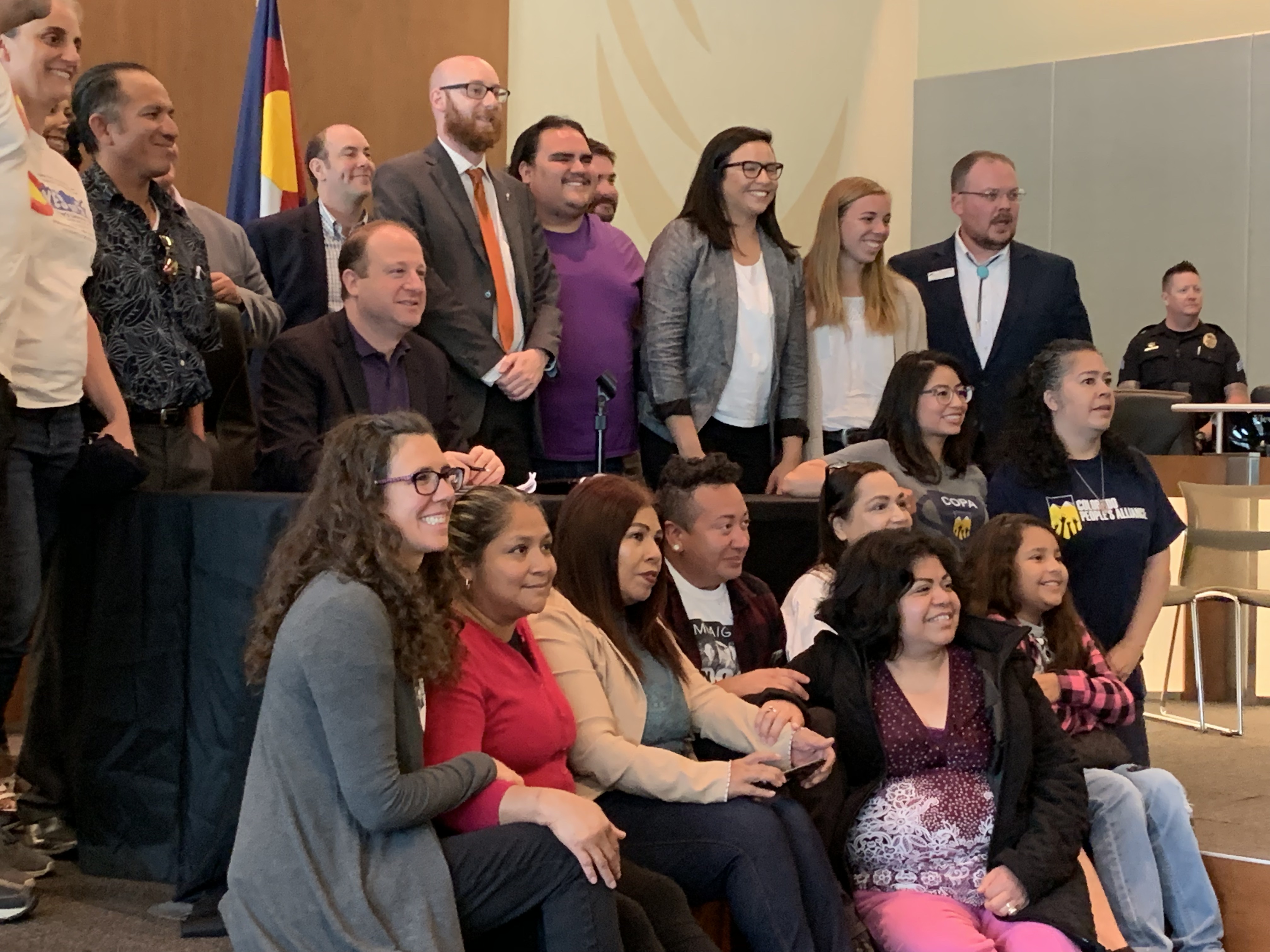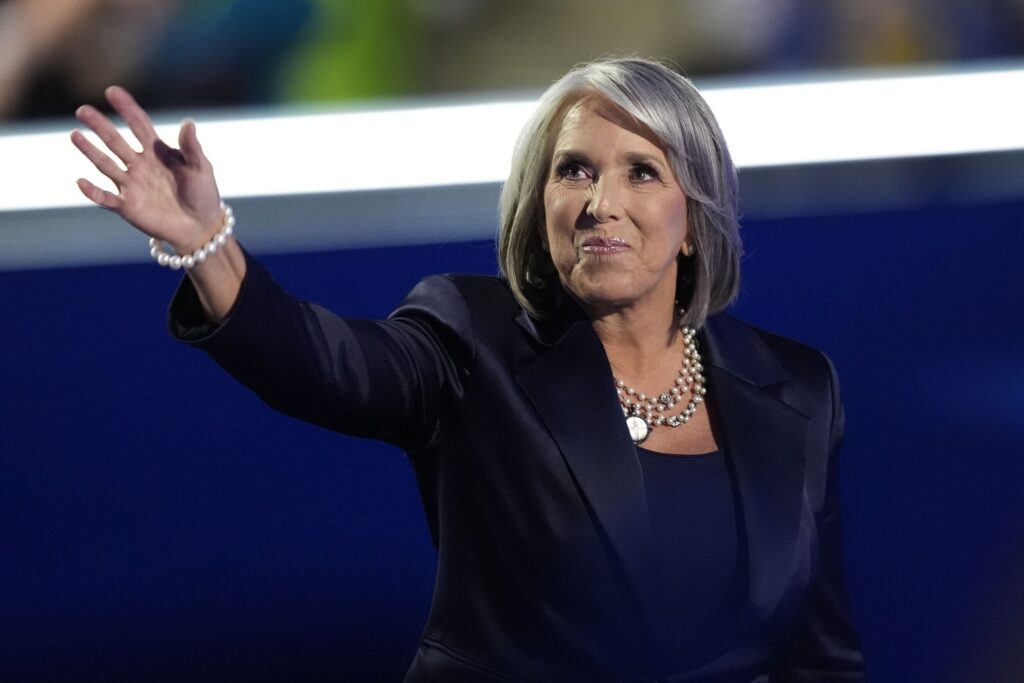Polis signs immigration-related bills into law

UPDATE 5/30: This story has been updated with a comment from Immigration and Customs Enforcement on House Bill 1124.
Colorado Gov. Jared Polis on Tuesday signed into law bills that will modify the legal landscape for undocumented immigrants in the state.
In response, U.S. Immigration and Customs Enforcement issued a statement the next day calling one of the measures “irresponsible” and saying it will “undoubtedly have tragic future consequences.”
ICE objected to House Bill 1124, which says that federal agents cannot use local jails to hold people suspected of being undocumented longer than their local sentence requires.
The bill was watered down in the House to satisfy concerns Polis raised. As introduced, the measure would have prohibited jail staff from talking to ICE officials.
As amended, the bill allows those local jail employees to notify ICE when an undocumented inmate is to be released.
Even so, ICE objected in its statement the next day.
“By signing Colorado’s House Bill 1124, the state has codified a dangerous policy that deliberately obstructs our country’s lawful immigration system, protects serious criminal alien offenders and undermines public safety,” said ICE spokesman Carl Rusnok in a statement to news media.
“Rather than honoring immigration detainers issued by U. S. Immigration and Customs Enforcement and allowing law enforcement agencies to work together to keep criminal aliens behind bars, criminals will now be returned to the streets throughout Colorado. This is an irresponsible law that will undoubtedly have tragic future consequences at the expense of innocent citizens, lawful residents and visitors.”
The bill won praise from immigration attorneys such as Hans Meyer of Denver, who testified in favor of the measure in a House committee hearing.
This law “will prevent deceptive and illegal ICE enforcement tactics while restoring the trust of victims and immigrant communities in local law enforcement and our state court systems,” Meyer said.
The law will “protect sensitive personal information so that ICE cannot manipulate the rehabilitative process of probation to advance its deportation agenda,” he said.
“It also clarifies that state law does not provide authority for [a] local sheriff to hold immigrants based on a civil immigration detainer, which will restore due process in our court system, promote trust in local law enforcement by victims of crime, and deter bias based policing,” he added.
Democratic Rep. Adrienne Benavidez of Commerce City said HB 1124 will make immigrants feel safer in their communities.
The law, which goes into effect on Aug. 2, ensures that Colorado jails will not honor requests from ICE to turn over those in custody, Benavidez said. Those in custody will be advised of their rights if ICE wants to talk to them, and they will be informed they don’t have to talk to the federal agency.
The law will also block probation officers from providing personal information to ICE on those on probation. Finally, the law will make it more difficult for law enforcement to enter into contracts with ICE.
“It’s not a perfect bill,” Benavidez said.
But it’s a good first step, added Sen. Julie Gonzales of Denver. Sen. Mike Foote of Lafayette noted that ICE will no longer be able to provide a civil administrative order to take custody of an immigrant, which he called “a permission” slip.
In a signing ceremony in Commerce City on TUesday, Polis also signed Senate Bill 139, which expands the number of offices offering driver’s license applications to undocumented residents.
The measure won bipartisan support in its trip through the General Assembly. That included votes in favor from rural Republicans who were swayed by concerns raised by members of the agriculture industry, who claimed that having driver’s licenses is a public safety issue for their employees.
RELATED: Colorado legislature passes bill expanding driver’s license program for undocumented immigrants
One of the Senate’s most conservative Republicans, Sen. Jerry Sonnenberg of Sterling, also voted in favor as a way of keeping track of where undocumented residents live.
The program has been a victim of its own success since its passage in 2013. Those who seek the appointments at one of three offices around the state that offer first-time licenses complain it takes months or even a year to get an appointment. That’s led to abuses in the system, including brokers who obtain and then sell the appointments, often for $100 or more.
The existing offices are in Colorado Springs, Grand Junction and Lakewood; a fourth, in Aurora, handles only renewals.
Under Senate Bill 139, the program will add immigrant licenses at existing Division of Motor Vehicle offices in Alamosa, Glenwood Springs, Lamar, Montrose and Pueblo in 2019 and in Sterling in 2020.
Democratic Rep. Jonathan Singer of Longmont, among the sponsors of Senate Bill 139, noted that while the bill lists six more offices, that’s “a floor,” he told Colorado Politics.
The bill lists a minimum of 10 offices, he explained, which means that as “we see more need in different communities” more offices can be added. “The sky’s the limit.”
Democratic Sen. Dominick Moreno of Commerce City lauded the work of former Sen. Jessie Ulibarri, the sponsor of the 2013 bill, and Rep. Jovan Melton of Aurora, also an early proponent.
“Because of partisanship,” Moreno said, the program “was crippled” in its early years. That’s a nod to conservative Republicans who insisted on capping the total number of licenses issued at 166,000, a number the state estimated it would reach in June.
“People should be able to drive to work or drive their kids to school,” Moreno said.
Tuesday’s signing ceremony was one of four such events. Polis signed three dozen bills, including two “ban the box” measures that prohibit employers and public colleges and universities from asking about an applicant’s criminal history on a job or college application (House Bill 1025 and Senate Bill 170, respectively).
Polis also signed House Bill 1210 on Tuesday, which allows local governments in high-cost areas of the state to set their own minimum wage.
RELATED: Colorado Senate amends but approves local minimum wage option
The governor has until Saturday to sign into law or veto any bills sent to him by the General Assembly. He’s scheduled to hold signing ceremonies every day this week. Wednesday, he’s expected to sign a group of measures dealing with marijuana.














